
Official Edgar Rice Burroughs Tribute and Weekly Webzine Site
Since 1996 ~ Over 10,000 Web Pages in Archive
Presents
Volume 5023

Official Edgar Rice Burroughs Tribute and Weekly Webzine Site
Since 1996 ~ Over 10,000 Web Pages in Archive
Presents
Volume 5023
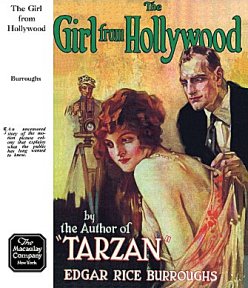
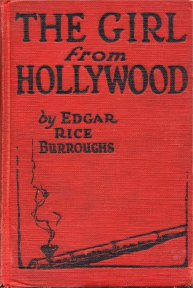
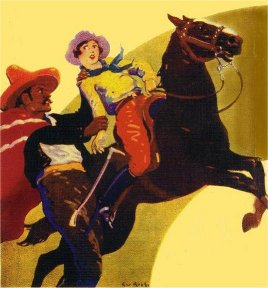
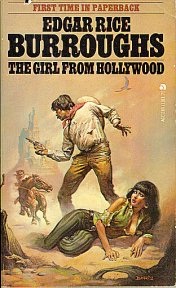
After the Communists took over Russia in 1917, class consciousness became more prevalent in America. Immigration had a lot to do with foreign ideas infiltrating traditional American ideology, but the growing gap between the rich and poor was most to blame. Some of this conflict is a back burning theme in The Girl from Hollywood.It first rears its ugly head in the attitude of Slick Allen after he is fired by Custer Pennington. If you recall, Slick taunts Custer: “You think you're the whole cheese, you Penningtons, don't you?... With all your money an your fine friends!”
Jealously and class hatred are apparent in these words. Don't worry, this ugly theme will rear its ugly head time and time again in the pages to come. You can imagine how ERB, a loyal Republican, personally felt about this issue, and if you cannot, there is plenty of times where he infuses the story with his own views. We will now review and analyze Chapters 3 and 4.
As you will recall, Custer and his close friend, Guy Evans, have shared some bootleg whiskey and now walk up to the big house for dinner.
CHAPTER THREE
As the two young men climbed the hill to the big house, a few minutes later, they found the elder Pennington standing at the edge of the driveway that circled the hill top, looking out toward the wide canyon and the distant mountains. In the nearer foreground lay the stable and corrals of the saddle horses, the hen house with its two long alfalfa runways, and the small dairy barn accommodating the little herd of Guernsey's that supplied milk, cream, and butter for the ranch. A quarter of a mile beyond, among the trees, was the red-roofed “cabin” where the unmarried ranch hands ate and slept, near the main corrals with their barns, outhouses, and sheds.This is as close to religion that ERB would ever get. He had no place for organized, ritualized religion, as his many novels attest. ERB could wax poetic at times, especially when he really loved things. Can anyone ever doubt that he really loved Rancho Tarzana?
The two young men joined the older, and Custer put an arm affectionately about his father's shoulders.
“You never tire of it,” said the young man.
“I have been looking at it for twenty-two years, my son,” replied the elder Pennington, “and each year it has become more wonderful to me. It never changes, and yet it is never twice alike. See the purple sage away off there, and the lighter spaces of wild buckwheat, and here and there among the the scrub oak the beautiful pale green of the manzanita scintillant jewels in the diadem of the hills! And the faint haze of the mountains that seem to throw them just a little out of focus, to make them a perfect background for the beautiful hills which the Supreme Architect is placing on his canvas today. An hour from now He will paint another masterpiece, and tonight another, and forever others, with never two alike, nor ever one that mortal man can duplicate; and all for us, boy, all for us, if we have the hearts and souls to see.”The front part of the real Rancho looked out over the San Fernando Valley to the north and then the hills and mountains past that. The Santa Monica Mountains were to the west while the Hollywood Hills and Mulholland Drive were to the south.
By the time ERB wrote this book the San Fernando Valley was quickly being developed. In the years to come Mr. Mulholland would come up with his bright idea to channel water from the Owens Valley in the Sierras to the Valley, thus starting a gold rush in land speculation. ERB lost a lot of money gambling on real estate in the years to come, but in 1921 he was at the height of his fame and wealth.
I was in Woodland Hills, very near the original Rancho, for the 2012 Dum Dum and Centennial Celebration, and it was hard for me to believe that even one square inch of the Valley and never been developed. Perhaps that is why ERB moved the location of Rancho del Ganado 70 miles to the north, so that he could reminisce about the way it had been when he moved into it in 1919. Old man Pennington may have spent 22 years looking out at the vista from his
driveway, but ERB had only been there for a little over two when he wrote the story.“How you love it!,” said the boy.ERB built a swimming pool at the Rancho, as well as a combination office, ballroom and theater on the property, in which his family showed films and held dances on weekends. Can you
“Yes, and your mother loves it; and it is our great happiness that you and Eva love it, too.”
The boy made no reply. He did love it; but his was the heart of youth, and it yearned for change and for adventure and for what lay beyond the circling hills and broad, untroubled valley that spread its level fields below “the castle on the hill.”
“The girls are dressing for a swim,” said the older man, after a moment of silence. “Aren't you boys going in?” The girls included his wife and Mrs. Evans, as well as Grace, for the colonel insisted that youth was purely a physical and mental attribute, independent of time. If one could feel and act in accord with the spirit of youth, one could not be old.
tell if ERB was becoming conscious of his age at the time, especially living among teenage kids?He was a brisk swimmer and competed with everyone in the water to show he had not lost his youth and vigor.Those familiar with the life of ERB will know that at one time he tried to join Teddy Roosevelt's Rough Riders during the Spanish-American War at the turn of the last century.
“Are you going in?” asked his son. “Yes, I was waiting for you two.” “I think I’ll be excused, sir,” said Guy. “The water is too cold yet. I tried it yesterday, and nearly froze to death. I’ll come and watch.” The two Penningtons moved off toward the house, to get into swimming things, while young Evans wandered down into the water gardens. As he stood there, idly content in the quiet beauty of the spot, Allen came down the steps, his cheque in his hand. At sight of the boy he halted behind him, an unpleasant expression upon his face. Evans, suddenly aware that he was not alone, turned and recognized the man. “Oh, hello, Allen!” he said. “Young Pennington just canned me,” said Allen, with no other return of Evan's greeting.
“I'm sorry,” said Evans.
“You may be sorrier!” growled Allen, continuing on his way toward the cabin to get blankets and clothes.
For a moment Guy stared after the man, a puzzled expression knitting his brows. Then he slowly flushed, glancing quickly about to see if any one had overheard the brief conversation between Slick Allen and himself.
A few minutes later he entered the enclosure west of the house, where the swimming pool lay. Mrs. Pennington and her guests were already in the pool, swimming vigorously to keep warm, and a moment later the colonel and Custer ran from the house and dived in simultaneously. Though there was twenty-six years’ difference in their ages, it was not evidenced by any lesser vitality or agility on the part of the older man.
Colonel Custer Pennington had been born in Virginia fifty years before. Graduated from the Virginia Military Institute and West Point, he had taken a commission in the cavalry branch of the service. Campaigning in Cuba, he had been shot through one lung, and shortly after the close of the war he was retired for disability, with rank of lieutenant-colonel. In 1900 he had come to California, on the advice of his physicians in the forlorn hope that he might prolong his sufferings a few years more.Thus, in many ways the Colonel is ERB’s wish-fantasy of an alternate life in which he was wounded in glorious battle and afterwards retired to the Rancho.
They will also know that Rancho Tarzana ended up being a large weight around his neck, one which he had to gradually give up to keep his family solvent. But that's another story.
And so Pennington had come West with Mrs. Pennington and little Custer, Jr., and had found the Rancho del Ganado run down, untenanted and for sale.
He judged from the soil and the water that Ganado was not well suited to raise the type of horse that he knew best, and that he and his father and his grandfathers before them had bred in Virginia; but he saw other possibilities. Moreover, he loved the hills and the canyons from the first; and so he had purchased the ranch, more to have something that would temporarily occupy his mind until his period of exile was ended by a return to his native State, or by death, than with any idea that it would prove a permanent home.
CHAPTER FOUR
Work and play were inextricably entangled upon Ganada, the play being of a nature that fitted them better for their work, while the work, always in the open and usually from the saddle, they enjoyed fully as much as the play. While the tired business man of the city was extending a day's vitality and nervous energy in an effort to escape from the turmoil of the mad rush-hour and find a strap from which to dangle homeward amid the toxic effluvia of the melting pot, Colonel Pennington plunged and swam in the cold, invigorating waters of his pool, after a day of labor fully as constructive and profitable as theirs.ERB was not made out for the nine-to-five business work day in the big bustling city, as can be seen from the passage above. Writing works of fantastic fiction had been his way out of the rat race. And what better way to avoid the melting pot of foreigners than to live out in the country on a ranch, where good old solid Protestant work values paid off best in the American pursuit of happiness. He would barely recognize the country today, but he saw what was coming.“One more dive!” he called, balancing upon the end of the springboard, “and then I'm going out. Eva ought to be here by the time we're dressed, hadn't she? I'm about famished.”Okay, now we know the time of the year: April. We also learn that Eva calls Guy's mother, Aunt Mae, though they are unrelated. We also learn that Eva is infatuated with Hollywood, for the man she danced with will turn out to be one of Hollywood's most seedy actor-directors. The real life Eva, Joan Burroughs, also had an infatuation with Hollywood, eventually marrying an actor who played Tarzan in an early silent film.
“I haven't heard the train whistle yet, though it must be due,” replied Mrs. Pennington.
“You and Boy make so much noise swimming that we'll miss Gabriel’s trumpet if we happen to be in the pool at the time!”
They were still bantering as they entered the house and sought their several rooms to dress.
Guy Evans strolled from the walled garden of the swimming pool to the open arch that broke the long pergola beneath which the driveway ran along the north side of the house. Here he had an unobstructed view of the broad valley stretching away to the mountains in the distance. Down the center of the valley a toy train moved noiselessly. As he watched it, he saw a puff of white rise from the tiny engine. It rose and melted in the evening air before the thin, clear sound of the whistle reached his ears. The train crawled behind the green of trees and disappeared.
He knew that it had stopped at the station, and that a slender, girlish figure was alighting, with a smile for the porter and a gay word for the conductor who had carried her back and forth for years upon her occasional visits to the city a hundred miles away. Now the chauffeur was taking her home along the wide, straight boulevard that crossed the valley – utterly ruining a number of perfectly good speed laws.
The headlights of a motor car turned in at the driveway. Guy went to the east porch and looked in at the living room door, where some of the family had already collected.
“Eva’s coming!” he announced.
With a rush the car topped the hill, swung up the driveway, and stopped at the corner of the house. A door flew open, and the girl leaped from the driver's seat. “Hello, everybody!” she cried.
Snatching a kiss from her brother as she passed him, she fairly leaped upon her mother hugging, kissing, laughing, dancing, and talking all at once. Espying her father, she relinquished a disheveled and laughing mother and dived for him.
“Most adorable, pops!” she cried, as he caught her in his arms. “Are you glad to have your little nuisance back? I’ll bet you're not. Do you love me? You won't when you know how much I've spent, but oh, popsy, I had such a good time! That's all there was to it, and oh, momsie, who, who, who do you suppose I met? Oh, you'd never guess – never!”
“Whom did you meet?” asked her mother.
“Yes, little one, whom did you meet?” inquired her brother.
“And he's perfectly gorgeous,” continued the girl, as if there had been no interruption; “and I danced with him – oh, such divine dancing! Oh, Guy Evans! Why how do you do? I never saw you.”
The young man nodded glumly.
“How are you, Eva?” he said.
“Mrs. Evans is here, too, dear,” her mother reminded her.
The girl curtsied before her mother's guest, and then threw her arm about the older woman's neck.”
“Oh, Aunt Mae!” she cried. “I'm so excited, but you should have seen him, and, momsie, I got the cutest riding hat!” They were moving toward the living room door, which Guy was holding open. “Guy, I got you the splendiferousest Christmas present!”
“Help!” cried her brother, collapsing into a porch chair. “Don't you know that I have a weak heart? Do your Christmas shopping early – do it in April? Oh, Lord, can you beat it?” he demanded of the others. “Can you beat it?”Guy obviously likes Eva, and you can just feel his anguish as Eva taunts them all with the man with whom she had been divine dancing. Yes, Eva – you could say, Biblically, she is a type of Eve of the Garden of Eden – has come back to the Colonel's perfect paradise. Does she have an apple to offer? We will have to wait and see. In the meantime, she is just beginning to mess with Guy's mind.
The colonel was glancing over the headlines of an afternoon paper that Eva had brought from the city.ERB hated the Eighteenth Amendment. Though he was a staunch Republican and would have gladly died for his country, he rebelled against this law, having a hidden stash of wine in his cellar the whole time it was against the law. Regardless of the rest of the nation, he still lived in the land of the free. That's called the American Spirit.
“What's new?” asked Custer.
“Same old rot,” replied his father. “Murders, divorces, kidnappers, bootleggers, and they haven't even the originality to make them interesting by evolving new methods. Oh, hold on – this isn't so bad! ‘Two hundred thousand dollars’ worth of stolen whisky landed on the coast,” he read. ‘Prohibition enforcement agents, together with special agents from the Treasury Department, are working on a unique theory that may reveal the whereabouts of the fortune in bonded whisky stolen from a government warehouse in New York a year ago. All that was known until recently was that the whisky was removed in trucks in broad daylight, compassing one of the boldest robberies ever committed in New York. Now, from a source which they refuse to divulge, the government sleuths have received information which leads them to believe that the liquid loot was loaded aboard a sailing vessel, and after a long trip around the Horn, is lying somewhere off the coast of southern California. That it is being lightered ashore in launches and transported to some hiding place in the mountains is one theory upon which the government is working. The whisky is eleven years old, was bottled in bond three years ago, just before the Eighteenth Amendment became a harrowing reality. It will go hard with the traffickers in this particular parcel of wet goods if they are apprehended, since the theft was directly from a government bonded warehouse, and all government officials concerned in the search are anxious to make an example of the guilty parties.”Well, I bet you can see how things are going down in the plot, can't you? We have the mysterious new trail and horsemen in the mountains on the Rancho, Guy shares a couple of bottles of bonded whiskey eight years in the “wood” with young Custer, Allen's threat that he knows one of Caster's fine friends is a bootlegger, and the stolen New York warehouse bonded whiskey taken around the Horn to the coast of southern California. Does it have anything to do
with the man Eva met in the city, to wit, Los Angeles? Time will tell.And if the whiskey is eleven years old, and was bottled in bond three years earlier, then it was eight years in the barrel. Aren't you glad we got that straight.
“Eleven years old!” sighed the colonel. “It makes my mouth water! I've been subsisting on home-made grape wine for over a year. Think of it – a Pennington! Why my ancestors must be writhing in their Virginia graves!”Well, at least we found out what kind of apple – or, in this case, hot potato – Eva brought to the table.
“On the contrary, they're probably laughing in their sleeves. They died before July 1, 1919,” interposed Custer. “Eleven years old – eight in the wood,” he mused aloud, shooting a quick glance in the direction of Guy Evans, who suddenly became deeply interested in a novel lying on the table beside his chair, notwithstanding the fact that he had read it six months before and hadn't liked it.
“And it will go hard with the traffickers, too,” continued young Pennington.
“Well, I should hope it would. They'll probably hang ‘em, the vile miscreants!”
Guy had risen and walked to the doorway opening upon the patio.
“I wonder what is keeping Eva,” he remarked.
“Getting hungry?” asked Mrs. Pennington. “Well, I guess we all are. Suppose we don't wait any longer? Eva won't mind.”
They had finished their soup before Eva joined them, and after the men were reseated they took up the conversation where it had been interrupted.
During a brief moment when she was not engaged in conversation, Guy seized the opportunity to whisper to Eva, who sat next to him.
“Who was that bird you met in L.A.?” he asked.
“Which one?”
“Which one! How many did you meet?”
“Oodles of them.”
“I mean the one you were ranting about.”
“Which one was I ranting about? I don't remember.”
“You're enough to drive anybody to drink, Eva Pennington!” cried the young man disgustedly.
“Radiant man!” she cooed. “What's the dapper little idea in that talented brain jealous?”
“I want to know who he is,’ demanded Guy.
“Who who is?”
“You know perfectly well who I mean – the poor fish you were raving about before dinner. You said you danced with him. Who is he? That's what I want to know.”
“I don't like the way you talk to me, but if you must know, he was the most dazzling thing you ever saw. He –”
“I never saw him. I don't want to, and I don't care how dazzling he is. I only want to know his name.”
“Well, why didn't you say so in the first place? His name's Wilson Crumb.” Her tone was as of one who says, “Behold Alexander the Great!”
“Wilson Crumb! Who's he?”
“Do you mean to sit there and tell me that you don't know who Wilson Crumb is, Guy Evans?” she demanded.
“Never heard of him,” he insisted.
“Never heard of Wilson Crumb, the famous actor-director? Such ignorance!”
“Did you ever hear of him before this trip to L.A.?” inquired her brother from across the table. “I never heard you mention him before.”
“Well, maybe I didn't,” admitted the girl; “but he's the most dazzling dancer you ever saw and such eyes! And maybe he'll come out to the ranch and bring his company. He said they were often looking for such locations.” “And I suppose you invited him?” demanded Custer accusingly.
“And why not? I had to be polite, didn't I?”
“You know perfectly well that father has never permitted such a thing,” insisted her brother, looking toward the colonel for support. “
”He didn't ask father – he asked me,” returned the girl.
“You see,” said the colonel, “how simply Eva solves every little problem.”
“But you know, popsy, how perfectly superb it would be to have them take some pictures right here on our very own ranch, where we could watch them all day long.”
“Yes,” growled Custer: “watch them wreck the furniture and demolish the lawns! Why, one bird of a director ran a troop of cavalry over of the finest lawns in Hollywood. Then they'll go up in the hills and chase the cattle over the top into the ocean. I've heard all about them. I’d never allow one of ‘em on the place.”
“Maybe they're not all inconsiderate and careless,” suggested Mrs. Pennington.
“They were just wonderful,” said Grace Evans. “I hope the colonel lets them come. It would be piles of fun!”
“You can't tell anything about them,” volunteered Guy. “I understand they pick up all sorts of riffraff for extra people – I.W.’s and all sorts of people like that. I’d be afraid.”The IWs, better known as the IWW, to wit, the International Workers of the World (aka, “Wobblys” – this slang term was still defined in the 1971 First Edition of the American Heritage Dictionary, but it disappeared in the 1992 Third Edition), was an early socialist union movement, the epitome of the Republican nightmare.
Years later in the 1950s, during the McCarthy witch hunt, an attempt was made to weed out all of the Commies in Hollywood (the infamous Black List was the result), a movement led in part by Ronald Reagan when he was
President of the Screen Guild.He shook his head dubiously.I assume that Julia is Mrs. Pennington. So ends Chapter 4, setting up the story for the next big chapter where the scene shifts suddenly to a Hollywood bungalow. But first, I must say how this last passage jogged an ancient memory of my childhood. I remember being at my Grandparents house one evening when I was about seven years old, where many relatives gathered around the piano for fun and song. Someone would go to the store and buy music, usually the new Billboard hits, and everyone would join in and sing the songs while my Grandma played the ivory keys. This was the early days of TV and the old traditions had not yet become obsolete.
“The trouble with you two is,” asserted Eva, “that you're afraid to let us girls see any nice-looking actors from the city. That's what's the matter with you!”
“Yes, they're jealous,” agreed Mrs. Pennington, laughing.
“Well,” said Custer, “if there are leading men there are leading ladies, and from what I've seen of them the leading ladies are better-looking than the leading men. By all means, now that I consider the matter, let them come. Invite them at once, for a month – wire them!”
“Silly!” cried his sister. “He may not come here at all. He just mentioned it casually.”
“And all this tempest in a teapot for nothing,” said the colonel.
Wilson Crumb was forthwith dropped from the conversation and forgotten by all, even by impressionable little Eva.
As the young people gathered around Mrs. Pennington at the piano in the living room, Mrs. Evans and Colonel Pennington sat apart, carrying on a desultory conversation while they listened to the singing.
“We have a new neighbor,” remarked Mrs. Evans, “on the ten-acre orchard adjoining us on the west.”
“Yes – Mrs. Burke. She is a widow from the East – has a daughter in Los Angeles, I believe.”
“She came to see me about a month ago,” said the colonel, “to ask my advice about the purchase of the property. She seemed rather a refined, quiet little body, I must tell Julia – she will want to call on her.”
“I insisted on her taking dinner with us last night,” said Mrs. Evans. “She seems very frail, and was all worn out. Unpacking and settling is trying enough for a robust person, and she seems so delicate that I really don't see how she stood it at all.”Two of my distant uncles, Francis and Milo, would do a Pat and Mike comedy routine that they had heard on the radio and we would roll on the floor in stitches. We always knew them as Uncle Pat and Uncle Mike, and even their wives called them that. It wasn't until I was in my thirties that I realized Pat and Mike were not their real names. Those days are gone, but there is true nostalgia in the memory of them.
So, who is Wilson Crumb, Mrs. Burke and her unnamed daughter?
Stay tuned for Chapter 5
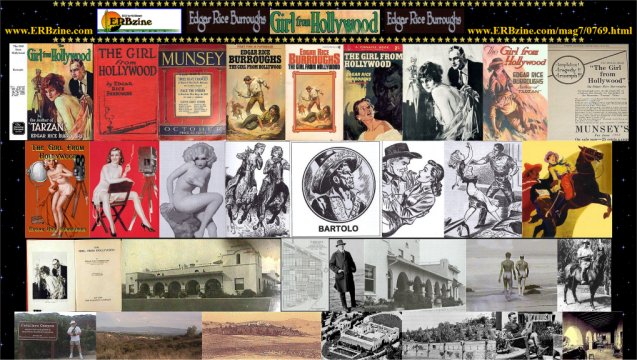
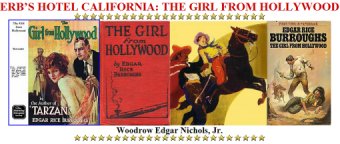
Read
The
Girl From Hollywood Text in ERBzine
See
the ERBzine Bibliography Entry
BACK TO EDGAR RICE
BURROUGHS' TARZANA RANCH 1921 - Docu/Novel
.
![]()
INTRODUCTORY AND CONTENTS PAGE
FOR
THE EDGAR RICE BURROUGHS ARTICLES
BY WOODROW EDGAR NICHOLS, JR.
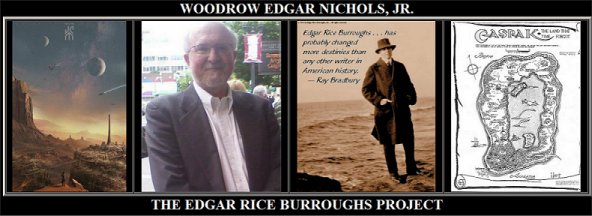
www.ERBzine.com/nichols
|
|
THE TRIMESTERS OF CASPAK |
|
by Woodrow Edgar Nichols, Jr. INTRODUCTION and CONTENTS |
![]()

![]()

BILL
HILLMAN
Visit
our thousands of other sites at:
BILL
AND SUE-ON HILLMAN ECLECTIC STUDIO
All
ERB Images© and Tarzan® are Copyright ERB, Inc.- All Rights Reserved.
All
Original Work © 1996-2014 by Bill Hillman and/or Contributing Authors/Owners
No
part of this web site may be reproduced without permission from the respective
owners.